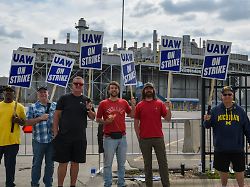Employees are “fed up”
Pressure on US car companies is growing
September 17, 2023, 9:03 p.m
Listen to article
This audio version was artificially generated. More info | Send feedback
In Detroit, all major car manufacturers are on strike. The United Auto Workers union is demanding steep wage increases in view of the car manufacturers’ profits. Currently 12,700 employees have stopped working. If their demands are not heard, they could expand the strike.
The head of the United Auto Workers (UAW) union has threatened to expand strikes at the three largest US automakers. “If we don’t get better offers (…) we will strengthen the whole thing even further,” said UAW President Shawn Fain on the TV station CBS. “We’re ready to do whatever we need to do.” The union members are “fed up”. The employees of the “Big Three” – General Motors, Ford and Stellantis with the Chrysler brand – stopped work in several plants at the same time for the first time on Friday night.
In view of the car manufacturers’ profits, the UAW is demanding significant wage increases – a demand that US President Joe Biden also supports. However, the labor dispute also puts him in a quandary: He traditionally presents himself as very pro-union, but a setback for the US economy could reduce his hopes of being re-elected in just over a year.
According to the union, 12,700 of the 150,000 workers represented by the UAW are currently taking part in the strike. Affected are a General Motors plant in Wentzville (Missouri), a Stellantis plant in Toledo (Ohio) and a Ford factory in Wayne (Michigan).
The “Big Three” once again generated high profits
The UAW is demanding salary increases of about 40 percent over four years. According to them, this corresponds to the increase in income of top managers. Many workers also point to the meager wages and benefit cuts they endured after the 2008 financial crisis, when General Motors and Chrysler filed for bankruptcy protection.
In recent years, the “Big Three” have again generated high profits. According to the union boss, employers have not yet gone beyond 20 percent in their offer. Negotiations are also not making progress with other demands such as additional vacation days.
